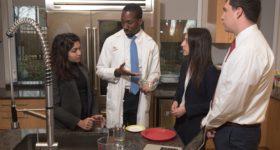
AUTHOR(S)
Sirisha Yalamanchi, MD
Kofi D. Essel, MD, MPH
Erin Hysom, RDN, MPH
Healthy Homes, Healthy Futures: An Obesity-Centered Home Visitation Curriculum for Pediatric Residents
This curriculum can be used with any resident in any year of training to help teach about the multifactorial causes of obesity as well as how to effectively counsel families around obesity management.
***Winner of the 2017 Innovation Award for Health Care Provider Training and Education.***
To learn more about the awards, please visit www.innovatinghealthcare.org.
Overview
A working knowledge of the home and neighborhood environment is critical to understanding the barriers that families face when struggling with obesity. Most doctors are only given the opportunity to address individuals with obesity in the office setting and usually describe their counseling abilities as ineffective. This focused home visitation curriculum offers a unique tool to improve residents’ understanding of the social determinants of health, how these determinants relate to obesity, and critical obesity-management skills. The curriculum requires residents to review three PowerPoint modules and an article on motivational interviewing. Residents then implement what they have learned by doing two home visits with a family from their continuity clinic and completing a windshield survey of the family’s neighborhood. This publication includes all of the materials necessary to facilitate the curriculum, including scripts for the residents to use at each visit, resources for the family, and curriculum evaluation tools.
Results
Twenty residents who completed the curriculum reported improved counseling skills and improved understanding of the social determinants of health. During post-curriculum qualitative interviews, residents described the experience as eye-opening and revealed that lessons learned from the visits will alter how they approach patients with obesity in their future clinical practice. The program has been integrated into our pediatric residency curriculum and completed during a first-year community health rotation, but it could be completed at any time during resident training.
This curriculum is specifically designed to include experiential learning by having residents apply the concepts they are being taught in the modules during the home visits, when completing the windshield survey, and when creating and presenting recommendations to the family. Although the modules can be reviewed in a didactic fashion, active learning can be increased by narrating the modules, having residents view them on their own, and then bringing the residents together for a discussion of concepts and questions. Narrating the modules also allows the residents to stop at any point and explore some of the additional resources mentioned. Our residents felt that the lessons learned from going through the curriculum were invaluable and were applicable to almost every encounter in their continuity clinic.
For successful completion of the Program, residents must complete four online modules and at least one home visit, in addition to compiling resources to assist their family. Residents also must complete pre- and post-testing around anti-fat bias, along with a final debrief/reflection session with co-residents or their program director.
See AAMC’s MedEdPORTAL for full curriculum, including materials needed to implement:
- How to Choose a Family
- Pre/Post-Test of Obesity Stigma
- Home Visitation 101 (presentation)
- Nutrition & Health 101 (presentation)
- Social Determinants of Health 101 (presentation)
- Assessment Visit Script
- Healthy Homes History Form
- Healthy Homes Assessment Checklist
- Healthy Homes Road Map to Success
- Healthy Living Goals Worksheet
- Healthy Homes Windshield Survey
- Healthy Homes Intervention Recommendations
- Intervention Visit Script
- Healthy Lifestyle Action Plan
- Resident Reflections Document
Keywords: Social Determinants of Health, Motivational Interviewing, Nutrition, Childhood Obesity, Overweight, Pediatric Residents, Home Visitation, Physical Activity, Healthy Lifestyles
